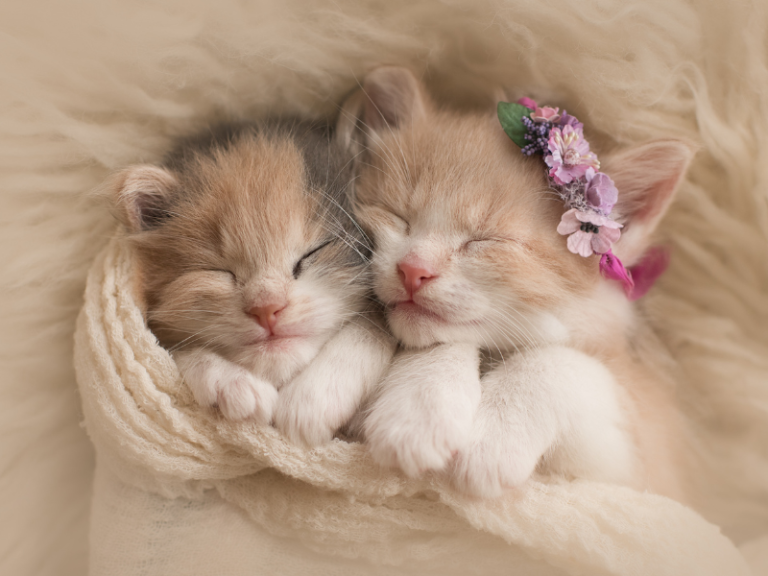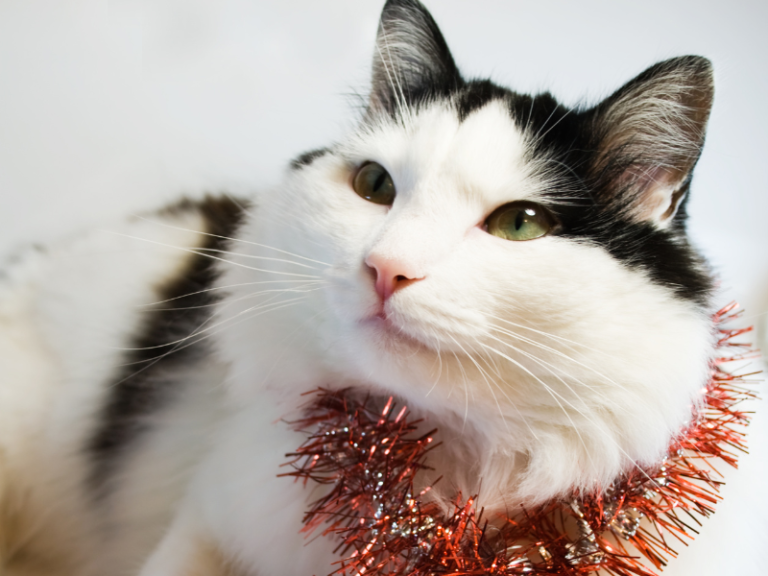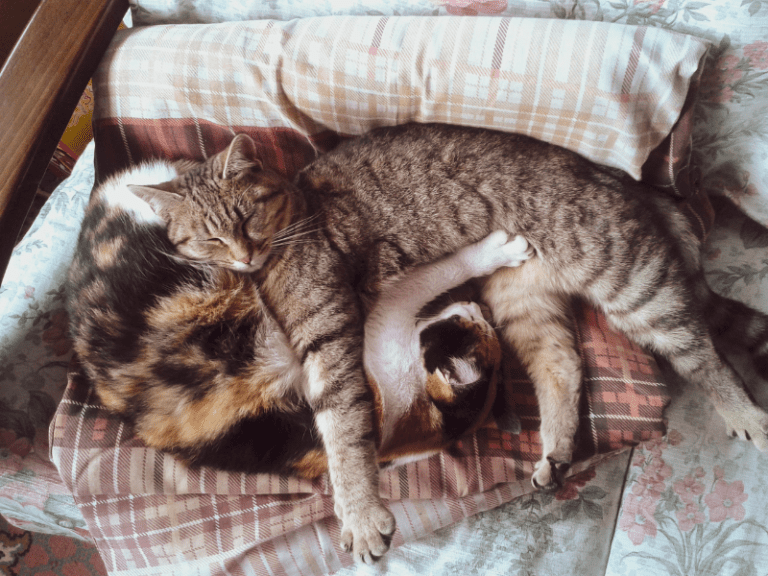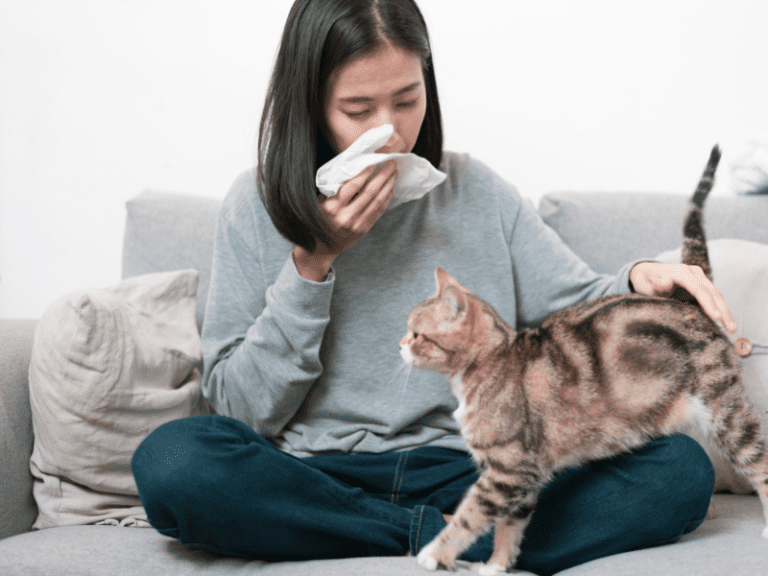Crazy Cat Ladies and Their Feline Companions
FULL DISCLOSURE: The links I share in this course ARE my affiliate links. This means I earn a commission, at no extra cost to you. In fact, sometimes you’ll get a discount or free credits just FOR using my link. 🙂
Looking for more pet tips? Join my email list to be notified every time I post!
Are you ready to have your perceptions of crazy cat ladies turned upside down? Buckle up, because we're about to debunk five crazy cat lady myths that have been perpetuated for far too long!
The term “crazy cat lady” has become synonymous with images of lonely, unkempt women with dozens of cats running amok. But the truth is, these myths are just that – myths.
Cat lovers come in all shapes, sizes, and genders, and being passionate about felines does not make someone crazy, unstable, or socially isolated.
So get ready to challenge your preconceived notions and discover the truth about cat ladies – it might just surprise you!
Crazy Cat Lady Stereotype
It's time to celebrate the joy and love that comes with being a cat lover! Despite the negative connotations associated with the “crazy cat lady” stereotype, the truth is that cat lovers come in all shapes, sizes, and genders, and they enrich our lives with their furry companionship.
Let's put an end to the myths and stereotypes that have been perpetuated for far too long. Being passionate about cats is a wonderful thing, and it doesn't make you eccentric, lonely, or mentally unstable. In fact, many cat lovers are socially active, mentally healthy, and lead fulfilling lives.
So whether you're a man, a woman, young, or old – if you love cats, wear that title with pride! Let's celebrate the diversity of cat lovers out there and promote a more accepting and inclusive view of this wonderful community. After all, life is better with cats, and there's nothing quite like the love and companionship of our feline friends.
Importance of debunking these myths:
It's time to put an end to the harmful stereotypes associated with the “crazy cat lady” label. These myths not only perpetuate negative attitudes towards cat lovers, but they can also be hurtful and stigmatizing for women who love cats.
The truth is, there's nothing “crazy” about being passionate about felines. Cat lovers come in all forms, and their love for their furry friends should be celebrated, not stigmatized. By challenging these myths, we can create a more accepting and inclusive society that values all forms of love and companionship.
Moreover, debunking these myths can help to remove barriers for women who love cats, both in their personal and professional lives. It can encourage more people to adopt cats and choose them as pets, without fear of being judged or stigmatized.
So let's break down these harmful myths and celebrate the joy and love that comes with being a cat lover. Let's promote a more positive and accurate portrayal of cat enthusiasts and create a world where everyone can feel proud of their love for their furry companions.
Myth #1: All single women with cats are “crazy cat ladies”

It's time to break down the harmful myth that all single women with cats are “crazy cat ladies.” This stereotype is not only unfair but also perpetuates negative attitudes towards women who choose to live their lives on their own terms.
The idea that unmarried or childless women are somehow incomplete or abnormal is outdated and simply not true. Women can be happy and fulfilled without conforming to societal expectations, and their choice to have cats as companions should not be a factor in how they are perceived.
The “crazy cat lady” label has been reinforced in popular culture through media portrayals, from cartoons to movies, painting women who live alone with their cats as strange and socially inept. But the reality is that many single women with cats lead perfectly normal and fulfilling lives, with careers, friends, and hobbies outside of their love for felines.
Examples of single women with cats who are not “crazy”:
The truth is, many single women have cats as pets and lead perfectly normal and fulfilling lives. They may be successful in their careers, have active social lives, and enjoy hobbies and interests outside of their love for felines.
For example, famous cat lover Taylor Swift has multiple cats, but she is far from the “crazy cat lady” stereotype. She is a successful musician, actress, and businesswoman who has many interests and hobbies outside of her love for her pets.
In addition to Taylor Swift, there are many other examples of single women with cats who are not “crazy cat ladies.” Actress and writer Mindy Kaling is a proud cat owner who frequently shares photos of her cats on social media. Kaling is a successful and accomplished woman, with a thriving career in entertainment and media.
Another example is actress and comedian Aubrey Plaza, who has been open about her love for cats in interviews and on social media. Plaza is known for her witty and irreverent humor, and has been a prominent figure in the entertainment industry for many years.
These examples illustrate that single women with cats come from all walks of life and are not defined by their love for their pets. They are successful, accomplished, and well-rounded individuals who happen to have cats as beloved companions.
Myth #2: Crazy Cat Ladies are Hoarders

Let's debunk the myth that cat lovers are hoarders! Contrary to popular belief, most cat owners are responsible pet parents who give their furry friends the love and care they deserve.
While sensationalized news stories and reality TV shows may depict cat lovers as hoarders, these portrayals couldn't be further from the truth. In reality, most cat owners understand the importance of providing their pets with proper care, including food, water, and medical attention.
Of course, we can't ignore the serious issue of animal hoarding, but it's important not to equate it with being a cat lover. Being a responsible cat owner can bring so much joy and love into your life, without any of the negative associations that come with the “crazy cat lady” label.
Debunking the Myth
It's important to recognize that the myth that “crazy cat ladies” are hoarders is not only untrue, but it's also harmful and stigmatizing. It reinforces negative stereotypes about cat lovers and perpetuates the idea that individuals with mental health issues are somehow abnormal or less deserving of respect and empathy.
In reality, cat ownership can be a wonderful and fulfilling experience for people of all backgrounds and mental health statuses. Many cat owners provide their pets with a safe and loving home, without any of the negative associations that come with the “crazy cat lady” label.
While animal hoarding is a serious issue that requires attention and intervention, it's not the same as being a cat lover. It's important to recognize that hoarding behavior is a complex issue that can affect anyone, regardless of their relationship with animals.
Myth #3: Crazy cat ladies are socially isolated

Let's put an end to this myth once and for all! The idea that “crazy cat ladies” are socially isolated couldn't be further from the truth. In fact, many cat lovers are outgoing, sociable, and have a vibrant social life.
The stereotype of the lonely, introverted cat lady is nothing more than a harmful caricature. Cat owners come from all walks of life and can be found in every corner of the world. They may have active social lives, be involved in their communities, and have close friendships with people from all walks of life.
So let's celebrate the diverse and vibrant community of cat lovers out there, and put an end to the myth that “crazy cat ladies” are socially isolated. After all, cats bring people together in all sorts of wonderful ways – from cat cafes to adoption events to online forums – and there's nothing “crazy” about that!
Examples of socially well-adjusted “cat ladies”:
In reality, many cat lovers are socially well-adjusted and have active social lives. They may be involved in their communities, have close friendships, and enjoy spending time with family and loved ones.
For example, actress and cat lover Kate Beckinsale has a close-knit group of friends and is frequently spotted out and about in social settings.
In addition to Kate Beckinsale, there are many other examples of socially well-adjusted “cat ladies” out there! Take, for instance, actress and comedian Kristen Bell, who frequently shares photos of her cats on social media and is known for her witty and relatable sense of humor.
Or how about singer and actress Mandy Moore, who is a proud cat owner and has been involved in animal rescue and advocacy for many years? Moore is a successful and accomplished woman, with a thriving career in entertainment and a loving family life.
And let's not forget about writer and activist Roxane Gay, who has written extensively about her love for her cats and the role they play in her life. Gay is a respected and influential figure in the literary world, and her openness about her love for her pets has helped to challenge harmful stereotypes and promote a more inclusive view of cat lovers.
Myth #4: All crazy cat ladies are women

The myth that all “crazy cat ladies” are women is a gendered stereotype that reinforces negative attitudes towards women and femininity. It is based on the idea that women who are passionate about anything – whether it's cats, fashion, or sports – are somehow hysterical or irrational.
This stereotype is particularly harmful because it suggests that men cannot love or care for cats in the same way that women do, which just isn’t true!
The truth is, people of all genders love and care for cats. Cats make wonderful companions for anyone, regardless of their gender identity. In fact, there are many famous men who have publicly expressed their love for cats, including Ernest Hemingway, Freddie Mercury, and Abraham Lincoln.
It's important to challenge gender stereotypes and recognize that everyone is capable of loving and caring for animals, regardless of their gender identity. Let's celebrate the diversity of cat lovers and create a world where everyone can feel comfortable expressing their love for these amazing creatures.
Men who love and care for cats:
There are plenty of men out there who love and care for cats just as much as women do! Take, for instance, actor and singer Ian Somerhalder, who is a proud cat dad and an advocate for animal welfare. Somerhalder and his wife, actress Nikki Reed, are passionate about rescuing cats and finding them loving homes.
Or how about musician and producer Pharrell Williams, who has spoken openly about his love for his cat, Prissy? Williams has been known to bring Prissy with him to interviews and events, and is a vocal advocate for animal rights and welfare.
Actor and comedian Ricky Gervais is a well-known cat lover who frequently shares photos of his cats on social media. He is passionate about animal welfare and has even spoken out against animal testing.
And let's not forget about comedian and actor John Mulaney, who frequently references his cat, Petunia, in his stand-up comedy and has been known to share photos of her on social media. Mulaney is a beloved figure in the entertainment industry, and his love for his cat has only endeared him to his fans even more.
These examples show that men can be just as passionate about their feline friends as women are.
Myth #5: Crazy Cat Ladies are Mentally Unstable

The myth that “crazy cat ladies” are mentally unstable is a harmful stereotype that is often perpetuated in popular culture. It implies that individuals who love cats are somehow abnormal or mentally ill, and reinforces negative attitudes towards mental health.
B. Examples of mentally healthy “cat ladies”:
In reality, many cat lovers are mentally healthy and lead fulfilling lives. They may have successful careers, active social lives, and engage in hobbies and interests outside of their love for cats.
For example, actress and cat lover Eva Longoria is a successful entrepreneur and philanthropist who is actively involved in her community. Longoria is known for her love of cats and has been a vocal advocate for animal welfare.
Another example is author and journalist Joan Didion, who has been a cat lover for many years and has written extensively about her feline companions. Didion is a highly respected figure in the literary world, with a long and impressive career spanning several decades.
These examples prove that being a cat lover is not an indication of mental instability or social isolation. It's time to debunk these harmful myths and celebrate the diversity and joy that comes with being a cat lover.
Breaking Down the Myths: Challenging the Harmful Stereotypes of Crazy Cat Ladies
So if you're a cat lover, wear that title with pride! There's nothing wrong with being passionate about your feline friends, and we should all strive to create a world where cat lovers are accepted and celebrated for who they are. After all, life is better with cats – and a little love and acceptance goes a long way.
Let's put an end to harmful stereotypes and celebrate the joy and love that cats bring to our lives. After all, life is better with cats – and with a little kindness and understanding, we can make the world a better place for them and for us all.
After you've finished reading this article, why not check out our article on fascinating cat facts? You'll learn some interesting and surprising things about our feline friends that you never knew before!







